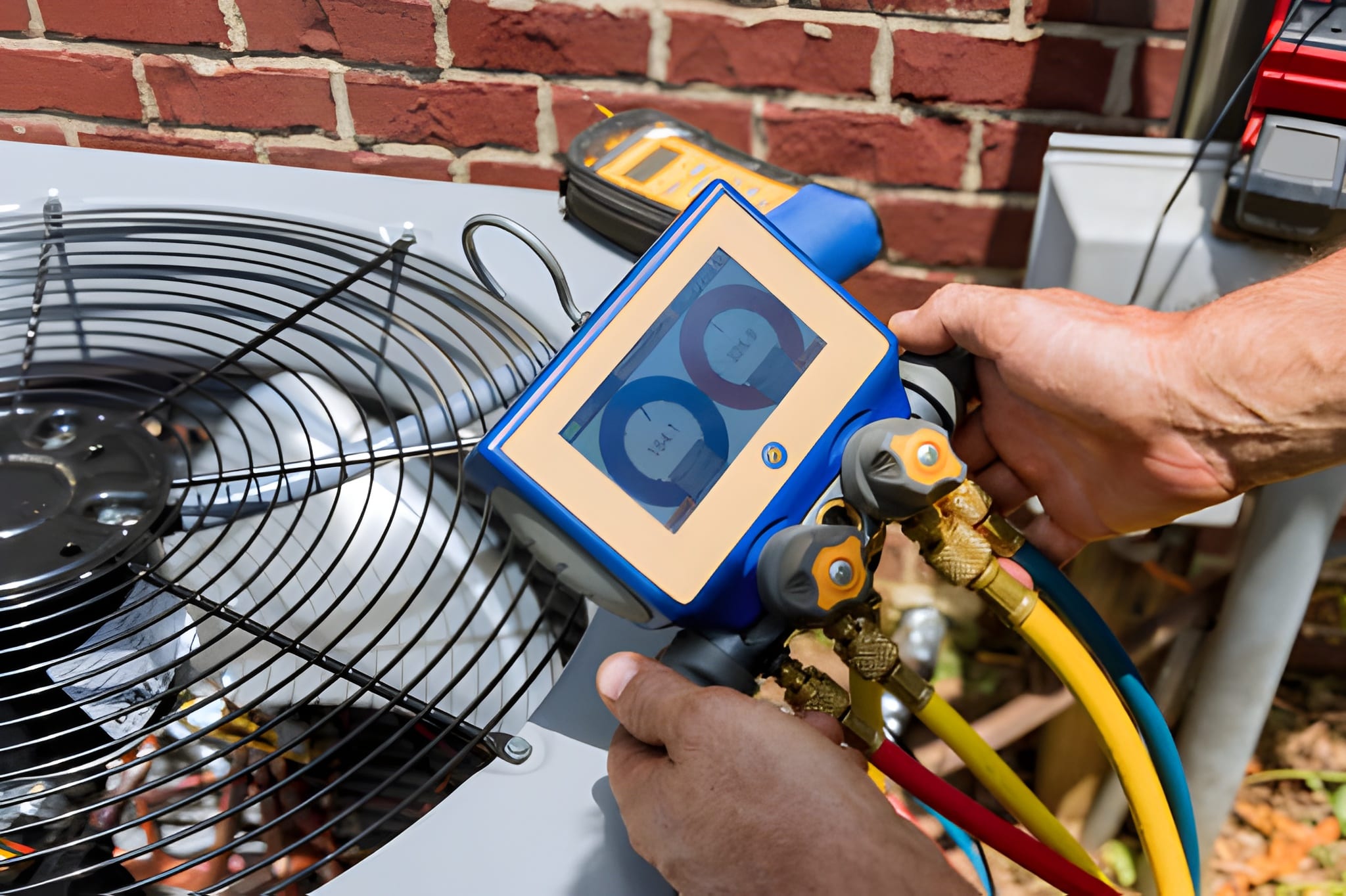
Walking into your home in Plum and catching a strong vinegar-like smell coming from your AC is never pleasant. You expect your air conditioner to keep the house cool and comfortable, not fill it with an odor that raises questions or worse, concerns. This type of smell usually doesn’t go away on its own and is often a sign that your system needs attention. Knowing what’s causing it and how to respond quickly can help protect both your home and indoor comfort.
If you’ve noticed this issue recently, especially during mid to late summer when local AC units are working hard, you’re not alone. Many homeowners in Plum experience this strange scent during peak cooling season. The good news is that there are common, solvable reasons behind this odor. Understanding those causes is the first step to fixing the problem and restoring clean, odor-free air inside your home.
Why Your AC Emits a Vinegar Smell
When your AC starts sending a vinegar smell through your vents, it usually means that something inside the system isn’t working the way it should. This smell can vary in intensity, but it’s often described as sour or acidic. Sometimes it starts off faint and worsens over time, especially if the system continues running without attention.
Common Causes of Vinegar Smell in Your AC
There are a few common issues that may be behind this unexpected smell:
1. Excess Moisture or Mold Growth
AC systems naturally pull moisture from the air. When that moisture doesn’t drain properly, it can lead to mold or mildew inside the system. Mold growth on coils, in ductwork, or near the drain pan can release a musty odor that some people say smells sour or similar to vinegar.
2. Clogged or Dirty Air Filters
Old, clogged filters don’t just reduce system airflow. They can trap bacteria and other particles that create unpleasant smells. If your filters haven’t been changed lately, they may be contributing to the odor circulating through your vents.
3. Blocked Condensate Drain Line
The drain line helps remove moisture collected during cooling. If it’s blocked, stagnant water may collect inside the unit. This can lead to bacteria buildup and generate strong smells, including ones often compared to vinegar.
4. Electrical Components Overheating
Less commonly, the vinegar smell may also result from a failing motor, wire insulation breakdown, or another electrical issue. Overheating can release chemical smells, which may be misidentified as vinegar-like.
5. Bacteria Growth Inside the Unit
Warm, moist environments can lead to bacterial activity around coils and drain lines. These bacteria can produce acetic acid as they break down organic materials, which gives off that distinct sour smell.
If you’re unsure what’s causing the smell in your own system, it’s best to have our technicians take a closer look. An onsite inspection allows us to identify the problem and fix it before it grows worse.
Health Concerns Related to Vinegar Smell
Even though the smell itself might be more annoying than dangerous, it can point to issues that affect indoor air quality and comfort. Mold spores, bacteria, and stagnant water inside your AC system can do more than just produce a bad smell. They may impact the breathing environment in your home.
Long-term exposure to contaminants linked to mold or bacteria can potentially irritate the respiratory system, especially for children, older adults, or anyone with preexisting allergies or asthma. Some signs that your indoor air may be affected include:
– Worsening allergy symptoms such as coughing or sneezing
– Burnt or itchy eyes when the AC is running
– Ongoing headaches or mild dizziness
– Skin irritation near vents or in rooms with strong odors
Keeping an AC system clean, dry, and free from buildup is an important part of maintaining healthy airflow indoors. Even if you’ve gotten used to the sour smell, that doesn’t mean it’s harmless. The longer the root cause is ignored, the more it can spread or impact other parts of the system. Many homeowners in Plum have noticed that once the vinegar-like smell appears, it tends to return until the issue is directly resolved. Addressing it early helps avoid larger problems.
Steps to Address and Fix the Vinegar Smell
Once a vinegar smell is coming from your AC, delaying a fix can allow the issue to spread or worsen. The key is figuring out what’s causing the scent and targeting that specific problem. Smells related to moisture, mold, or mechanical issues need different solutions, which is why a general approach won’t work.
Here’s what typically happens once our professionals arrive to resolve the issue:
1. Inspection of Key Components
Our technicians begin by checking all common sources of the smell: air filters, evaporator coil, drip pan, and condensate drain line. They also test components like motors and wiring if a burning odor is present.
2. Cleaning the Internal AC Parts
If buildup is causing mold or bacteria growth, our technicians clean the coils, drain pan, and any affected duct areas. Specialized cleaners are used to remove mold and discourage it from coming back.
3. Clearing the Condensate Drain
A blocked drain line is a frequent cause of moisture-related odors. Our team flushes out the line and ensures it drains properly so that water doesn’t pool inside the system.
4. Replacing Dirty Filters
Filters full of debris or organic buildup can influence how your AC smells. Swapping them with fresh ones immediately changes airflow and helps get rid of lingering odors.
5. Identifying Electrical Problems if Present
If there’s any sign of overheating or chemical smells, the electrical parts are reviewed. Our technicians check motors, capacitors, and wires for visible damage or abnormal heat levels.
In one example from a home in Plum, a homeowner noticed a sour odor that kept getting stronger every day. When we inspected their unit, the drain line was completely blocked and water had collected inside the coil compartment. After cleaning the area and clearing the line, the smell was gone within hours of restarting the system.
It’s common for people to try using sprays or air fresheners to mask the smell, but that won’t solve the actual issue. If left alone, a simple moisture problem can become a mold issue or cause damage to internal system parts. Having the system evaluated and repaired prevents costlier problems down the road.
Preventive Measures for Future Issues
Once the vinegar smell’s been handled, the next smart move is making sure it doesn’t return. Regular care matters more than people think, especially for AC systems working around the clock during the summer in Plum.
To help stop odors from showing up again, here are a few long-term practices that work:
– Replace air filters every 1 to 2 months during summer use
Don’t wait for a smell or airflow drop. A clean filter keeps particles out and helps airflow stay steady.
– Schedule seasonal AC inspections
Before summer reaches its peak, a technician can check for buildup, test lines, and spot mold-friendly conditions inside your unit.
– Watch for early warning signs
Slow draining water, sudden stuffy smells, or weak airflow are worth checking out early. Ignoring them might turn a small issue into a bigger one.
– Keep areas around outdoor units clear
Organic buildup and plant growth around the AC unit can lead to higher moisture levels, which promote mold growth inside the system.
– Don’t block indoor vents
Clear airflow helps the system dry out moisture through natural circulation. Blocked vents may allow humidity to settle inside the ducts.
Simple changes like these can add years to a system’s lifespan and help avoid odors related to moisture or bacteria.
Ensuring Fresh Air in Your Plum Home
For homeowners in Plum, running an AC system 24/7 in late summer is common, but that shouldn’t come at the cost of air quality. When your cooling system smells like vinegar, it may seem like a small annoyance at first. In reality, it’s usually a sign that something isn’t working right or hasn’t been maintained for a while.
If your home smells sour each time the AC starts up, don’t ignore it. That odor can mean mold, bacteria, drainage problems, or failing parts. Letting it run day after day without a fix can harm both your unit and home environment.
The quicker the smell is addressed, the easier it is to prevent damage, reduce repair costs, and return your indoor air to a clean, neutral scent. Regular inspections and ongoing maintenance are both good ways to keep comfort levels high and smells under control. If the vinegar smell shows up again, getting help fast is the best move.
When unpleasant odors persist, our professionals at Supreme Heating and Cooling understand how disruptive a lingering vinegar smell can be in your home. Consider incorporating AC installation in Plum as part of your long-term maintenance plan to keep your system running reliably and help prevent future issues. For a quick estimate or to book a service visit, please contact us today.

.svg)

.webp)


.svg)
.webp)
.svg)
